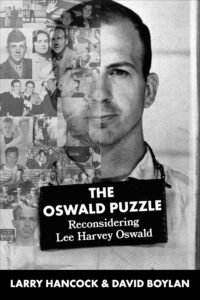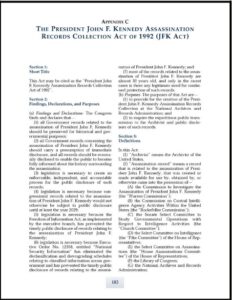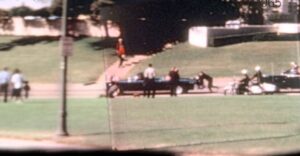 With the publication of The Oswald Puzzle, authors Larry Hancock and David Boylan reevaluate our current understanding of Lee Harvey Oswald. With meticulous attention to the documentary record, Hancock and Boylan have produced a reasoned assessment of out dated assumptions and introduced a framework for exploring new avenues of inquiry. Drawing from many decades of sources, the authors present a contemporary, multi-dimensional representation of Oswald as a real person rather than the empty and exclusively manipulated empty vessel into which so many students and scholars have invested what they imagine or would want to be true.
With the publication of The Oswald Puzzle, authors Larry Hancock and David Boylan reevaluate our current understanding of Lee Harvey Oswald. With meticulous attention to the documentary record, Hancock and Boylan have produced a reasoned assessment of out dated assumptions and introduced a framework for exploring new avenues of inquiry. Drawing from many decades of sources, the authors present a contemporary, multi-dimensional representation of Oswald as a real person rather than the empty and exclusively manipulated empty vessel into which so many students and scholars have invested what they imagine or would want to be true.
The AARC is pleased to present the following feature written by the authors of The Oswald Puzzle:
Larry Hancock and David Boylan Q&A
How intelligent was Oswald?
In school, Lee Harvey Oswald tested at a level of 118 – ‘very bright’ – on the standard intelligence test of his time. His documented reading choices in history, geopolitics, philosophy, fiction, and literature confirm his intelligence, as do reports of his knowledge from his time in the Marine Corps and his personal friends. In the Marines, he tested for and was placed in a technical career field, did well in his training, and was evaluated as quite competent in his career field. Later, in a series of employment-related tests he performed well and was also evaluated positively in his interviews and personal presentation.
How politically radical was Oswald?
As a teenager, Oswald wrote to the American Young Socialist Federation proclaiming his socialist beliefs and applying for membership. He also asked about any local groups he might join and, as an alternative, inquired about forming one himself. His reading through his teenage years, through his time in the Marine Corps consistently reflected his beliefs in socialist principals, interest in Marxism, an aversion to racism and a commitment to economic justice. Those beliefs are confirmed in his media statements over time as well as in a series of papers and monographs he wrote over the year prior to his death. At no time did he personally espouse or champion violent political or revolutionary action, however, he was a declared supporter of the Cuban revolution against the corrupt Batista regime and opposed ‘Yankee’ business imperialism across Latin America.
Was Oswald a Socialist/Marxist/Communist?
Oswald was a confirmed Socialist and frequently used the term Marxist and Socialist interchangeably. He had studied Marx and was certainly a believer in Marx’s critiques of pure capitalism and its negative effects on the working class. He was not hesitant to declare himself a Marxist in media appearances. Following his time in Russia he did become a critic of the Russian system, and specifically of the Soviet use of ‘communist’ doctrine and international communist parties for its nationalistic goals – that criticism appears in his writings of 1963. Those writings also propose a compromise system between Capitalism and Marxism, one allowing more personal freedom but ensuring basic rights such as health care and access to education for all.
What about Oswald and guns?
Like many young men of his time and place, Oswald had a definite interest in guns – first described by one of his teenage friends in New Orleans and extending to the collection of shooting and hunting magazines taken into custody with his personal possessions in 1963. He owned and was disciplined for a personal weapon in the Marines. In Russia, he joined a factory shooting club, bought a shotgun and went hunting on occasion. In New Orleans, had a number of conversations about rifles and browsed rifle and hunting magazines at a garage near his workplace. When in custody in Dallas he had a pistol in his possession and a number of people had seen a picture of him with a pistol and rifle. Unfortunately, following his arrest, he was not shown nor directly questioned about the rifle taken into custody at the Texas School Book Depository.
Was Oswald violent – or was he a ‘Drama Queen”?
We have no history of Oswald threatening anyone or picking fights. In school, largely because of his being independent, he was bullied on occasion and responded if he was physically attacked. When that sort of thing happened in New York schools, he turned to truancy rather than fighting. His discipline problems in the Marines did not involve aggressiveness other than the fact that he would push back verbally when he felt he was being unfairly treated – as in one incident with his non-commissioned officer supervisor. Oswald was neither passive nor restrained in expressing his views, he could be quite demonstrative. But he had no recorded history of actual physical aggression nor long term pattern of violent behavior.
In contrast Oswald’s tendency towards expressiveness and verbal assertiveness could and did lead to his making dramatic ‘gestures.’ He lost a stripe and ended up in the brig in the Marines for accusing a duty NCO of picking on him, even tossing a drink onto the Sergeant in a club. He managed to remain in the Soviet Union only by lightly cutting his wrists and getting committed to a hospital on the day the Soviets were forcing him out of Russia because his tourist visa was expiring. When performing pro-Cuba leafletting in New Orleans, he taunted expatriate Cubans, suggesting they hit or attack him. In Mexico City he accused a Cuban diplomat of betraying their revolution and later displayed a pistol to Soviet diplomats and claimed that he was being harassed and threatened by the FBI. And in the fall of 1963, he visited the FBI office in Dallas, complaining of his wife being harassed and leaving a letter of protest (immediately destroyed by the FBI after the assassination).
Oswald and JFK – motive or not?
This question was a real challenge for the Warren Commission given that they could locate no individual in contact with Oswald who had heard him speak out about President Kennedy much less threaten him in any fashion. Oswald’s spoken remarks and his writing circa 1963 were very much aligned with Kennedy’s goals of integration, and coexistence with the Soviets. He expressed the thought that JFK might be the only one who could achieve some sort of détente with Khrushchev. Overall, his public and written views were very much in sympathy with JFK’s “New Frontier” challenge of establishing opportunities for all.
The one administration policy which Oswald did oppose was the political and economic embargo of Cuba and American actions against the Castro regime. When questioned about that on radio about JFK and Cuba, in the summer of 1963, Oswald refused to personalize his response by any direct remark against President Kennedy himself, but simply stated his opposition to it as an ongoing American policy.
Oswald and the FBI – was he an FBI asset?
Oswald’s FBI history demonstrates that he was irritated by the FBI questioning him following his return from the Soviet Union in 1962, he also realized that his mail was being monitored and opened and felt the FBI was likely behind that – he protested the opening to the U.S. Postal Department. During 1963 he expressed concerns about FBI harassment on multiple occasions, in Mexico City, in a letter to the Soviet Embassy in New York (in which he complained that his wife had been visited and that the FBI might be attempting to persuade her to defect from her Russian citizenship) and finally in a personal visit to the FBI Dallas officer with a letter of protest. After the assassination, in custody and being question, he accused an FBI agent present in the room of harassing his wife.
In contrast, during his time in New Orleans in the summer of 1963 Oswald had actually requested to be interviewed by the FBI and had provided documents and information about the Fair Play for Cuba Committee and activities of what appeared to be a clandestine FPCC group meeting in that city. He did not offer any information about the anti-Castro Cubans he had contacted but instead overtly lied about the FPCC group, its membership, meetings and its leader (Hidell) who was a fictional character created by Oswald himself. The only information known to have been given to the FBI was false, resulting in a totally needless FBI inquiry about Hidell and the non-existent FPCC group.
Was Oswald a witting CIA asset with intelligence missions?
There is some evidence suggesting that upon his return to the US from the Soviet Union Oswald did provide limited information about his time in Russia and his factory job there. That information was forwarded to CIA Russia Division from New York City, most likely from the State Department which had been the vehicle for communication to the FBI, CIA and other agencies while Oswald was in Russia. The State Department itself had actively opposed and delayed Oswald’s return. Oswald was an American citizen who had legally traveled to Russia and never officially rejected that citizenship. He had not legally ‘defected’ nor obtained Russian citizenship although he had initially rejected it and made anti-American remarks to US press in Moscow following his arrival there. Oswald was offered Russian citizenship during his efforts to return to the US but declined; he later wrote an unpublished monograph which was quite negative regarding his time in Russia and critiquing the Soviet system. Beyond that Oswald’s own activities do not correspond to any of the known CIA intelligence operations which used volunteers traveling to Russia.
Oswald’s appearance in Mexico City has been discussed as another possible CIA intelligence mission, however his time there was very short – a matter of a few days – and his contacts with the Cubans and Russians quite limited. Beyond that we now know of a number of pre-existing intelligence actions against the Russians in Mexico and especially the Cubans. Those operations were underway long before his appearance and continued afterwards, there is no correlation with his actions there – if anything they increased Cuban suspicions of CIA efforts against their diplomatic missions and personnel in Mexico.
Was Oswald unwittingly known to and used by the CIA?
The delayed opening of a CIA file on Oswald – a year following his arrival in Russia – and the CIA counter intelligence compartmentalization of information being reported on him by the State Department from the Soviet Union suggests the development of some type of special CIA counter intelligence interest in Oswald. Following his return to the US there was a routine CIA Domestic Operations interest in Oswald but we lack any records related to that interest and reporting on him.
Oswald’s activities in New Orleans in 1963 did expose him to a variety of CIA assets including the Cuban Student Directorate (DRE) which reported their contacts with him to their headquarters and should have made that information available to their CIA case officers – especially once the DRE started its own propaganda efforts around Oswald in August 1963. We also lack the records that should have documented that interest. During Oswald’s appearance in Mexico City, information on him was withheld from the CIA Mexico City station, suggesting that CIA Special Affairs Staff (Cuba Project) were either engaged in or planning some operational, but unwitting, use of Oswald as of October, 1963.
Why would Oswald be in Mexico City in the fall of 1963?
Beginning in January/February 1963 Marina Oswald had begun a series of communications and applications for her and June Oswald’s return to Russia. Oswald’s return was a possibility but as Marina was a Russian citizen hers would have been more straight forward. By the end of summer Marina had paperwork in place requesting the return but was advised that processing would not occur for some months. Oswald’s correspondence stated that Marina, then present, and her children should receive urgent consideration while his should be considered separately. At that point Marina herself testified that his personal interests were focused on Cuba.
In Mexico City, Oswald visited the Cubans with a request for a tourist visa which would allow him to be in Cuba while his wife’s request was being processed in Russia. He claimed to be increasingly fearful in the US because of his pro-Castro and pro-Cuba media visibility – he carried samples of that activity in an effort to persuade the Cubans of his case. He visited the Russian embassy with the same story, making his situation more dramatic by stating that the FBI was targeting him and his life might even be at risk.
Why was Oswald’s behavior the day of the assassination suspicious?
Oswald was known to be an avid follower of the news on both television and in the newspapers but showed no special interest in the President’s arrival in Dallas. The lack of any highly visible enthusiasm was not out of character for Oswald who generally held himself aloof from American politics (other than to speak out against racism and racist political figures) and any type of ‘fandom’ for politicians. What was out of character was his decision to immediately leave the area of the attack on the president during the chaos and general questioning about what had just happened.
Back at his apartment he failed to follow television programming (Oswald was known to be a frequent television viewer) or to ask questions about what had happened. In itself his decision to turn to an afternoon movie rather than live news coverage was very much out of character for Oswald – irrespective of any other of his movements or actions. The authors of The Oswald Puzzle present research and a scenario which relates Oswald’s anomalous activities to his Cuban agenda, and to his manipulation as a patsy in the assassination – a view in line with Oswald’s own personal character and agendas entirely independent of the Kennedy assassination.
[End of Q&A]*****
Among the many enigmas in the saga of President John F. Kennedy’s assassination, Lee Harvey Oswald remains among the most enigmatic. The Warren Commission painted a portrait of a lone malcontent, but still could find no motive for his alleged actions. Some conspiracy books attempt to turn Oswald into a deep cover intelligence agent, always on assignment whether defecting to the Soviet Union or distributing pro-Castro pamphlets. Other authors ignore Oswald altogether.
In The Oswald Puzzle, veteran researchers Larry Hancock (Someone Would Have Talked, Tipping Point) and David Boylan square the circle. Taking the full measure of the same data the Warren Commission collected, they paint a contrarian picture of Oswald, a man that may surprise you. And then, using their expertise and the vast declassified records now available, they tell the story of how Oswald appeared on the radar of fervent anti-Castro activists in New Orleans in 1963, and how he was then turned into their pawn.
Hancock and Boylan, in considerable detail, provide a scenario which reconciles Oswald’s actual history and character with the massive evidence of conspiracy in the assassination of President Kennedy. Has the puzzle of Lee Harvey Oswald finally been solved? Was Oswald a murderer or a patsy? The Oswald Puzzle provides new answers.
Editorial Reviews
Praise for Larry Hancock’s Work:
Larry Hancock’s stalwart and multi-year effort to unveil the truth about who was really behind JFK’s murder comes together remarkably in “Tipping Point.” I don’t know of another independent researcher that’s been able to put the many pieces together in such a cohesive and compelling way. – Dick Russell, author of “The Man Who Knew Too Much” and “On the Trail of the JFK Assassins.”
Larry Hancock’s new book, Tipping Point is a concise summary of his decades long investigation into the assassination of President Kennedy. I have been following Larry’s work since his landmark Someone Would Have Talked, which firmly puts to rest the often repeated and demonstrably false claim that if there was a conspiracy to kill the President someone would have talked. They talked all right, and Larry documents a dozen cases, each of which leads to the heart of the case. I pretty much see eye to eye with Larry Hancock, and while we are usually on the same page, Larry always seems to be ahead of me, so I know I will learn something new from anything he writes. – Bill Kelley, The JFKCountercoup Blog
Larry Hancock and I have worked on multiple projects over the years, back to the first edition of “Someone Would Have Talked” and “NEXUS.” I am delighted to see the culmination of three decades of deep research appear in “Tipping Point.” I’m proud of Larry’s fine work — his books are ones we look forward to — and learn from. – Debra Conway, JFK Lancer
Tipping Point is the culmination of the consistent and coherent; it is history as it should be written. Larry Hancock establishes concise a concise timelines which plots a path through the labyrinthine details that have been collected by a diverse array of researchers and investigators over the past several decades, presenting a detailed picture of the tactical elements of the attack in Dallas Texas on November 22 1963 – an attack which altered the future of the nation JFK had been elected to lead. – Chuck Ochelli, The Ochelli Effect
About the Authors
Larry Hancock brings his formal training in history and cultural anthropology to his research and writing on Cold War history and national security subjects. A graduate of the University of New Mexico, he earned his BA with honors, majoring in history, cultural anthropology and education. Following service in the United States Air Force, his pursued a career in technical education, computer/communications, and technology marketing.
Larry then returned to his long term interest in historical research. Known as a “document geek,” he researched and published several collections of CIA, FBI and military documents prior to beginning his writing efforts. His document work led to his becoming a board member of the Mary Ferrell Foundation, a major online interactive history archive.
With a dozen books in print, his works include an exploration of long term patterns in covert action and deniable warfare (“Shadow Warfare” and “In Denial”), the effectiveness of national command authority and command and control practices (“Surprise Attack“), and the political assassinations of the 1960’s (“Someone Would Have Talked”, “Killing King” and “The Awful Grace of God”) His most recent book is “Tipping Point / The Conspiracy That Murdered President John Kennedy.”
David Boylan is a former IT professional at Brown University. He has a rich background in research and analysis related to the JFK assassination. His work includes his co-authorship with Larry Hancock on The Wheaton Lead: An Exploration, The Red Bird Airfield Leads, and author of the monograph, A League of Their Own: A Look Inside the Christian Defense League. Boylan is a frequent presenter at the JFK Lancer conferences in Dallas and is a longtime researcher of the JFK assassination with focus on the documentary record.
Order THE OSWALD PUZZLE by clicking HERE




